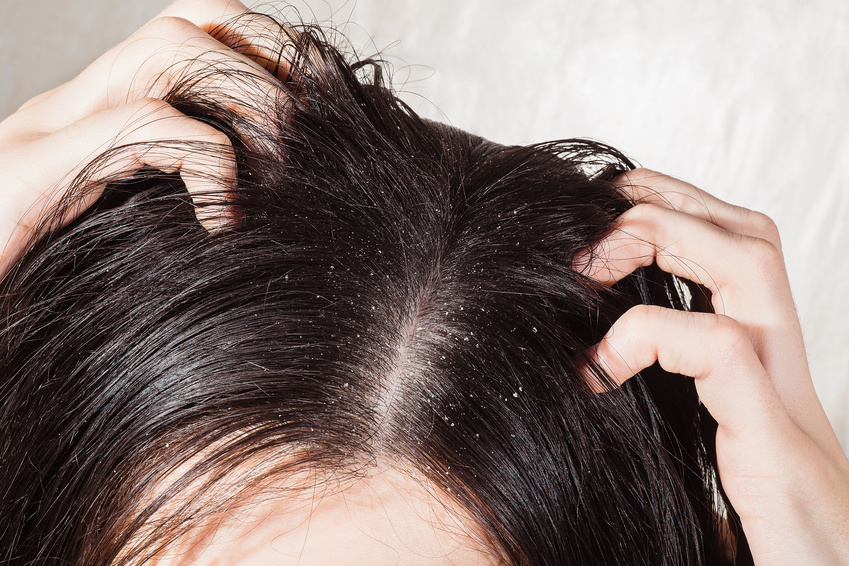
Although the temperatures are heating up, seasonal changes might still be affecting your appearance. From pollen allergies to dehydration, your skin may be in need of some TLC. That applies to your hair and head, too. While 54% of women say they’re their own worst beauty critic, no one wants to deal with an itchy scalp or embarrassing flakes. But if you assumed these symptoms automatically point to dandruff, you could be mistaken. Let’s take a look at what might be causing your scalp to flake and itch, as well as how you can treat it just in time for the dog days of summer.
Got an Itchy Scalp? Those Flakes Might Not Be Dandruff After All
Allergic Reactions
Spotting flakes might prompt you to lather up more frequently, but that could do more harm than good. If you’ve recently tried out a new hair product and are experiencing an itchy scalp or general irritation, you might want to discontinue the use of your shampoo or conditioner for a bit. Some hair product ingredients — usually fragrances or propylene glycol, which is meant to moisturize — can actually cause allergic reactions. Stop using any new additions for a week or so and replace them with products free of fragrances and parabens if your scalp irritation goes away.
It’s also possible that your styling tools could be causing irritation. Your blow dryer, flat iron, or curling wand can dry out your scalp due to the high heat. If you can air dry your hair at least some of the time, your scalp will thank you. And if you have to use styling tools, keep the heat settings on low or medium.
Product Build-Up
Even if you don’t experience any allergic reactions, your hair care products could be to blame for your itchy, flaky scalp — especially if they contain silicone. Though this ingredient makes hair shiny and smooth at first, it can actually have the opposite effect if it’s not washed out properly or used too often. That’s due to product build-up, which can lock in allergens and irritants in your products and make your scalp dry, red, and itchy. This will also keep your scalp from being able to shed naturally like the rest of your skin does. Hairspray can be a major culprit here.
Try switching it up and remove styling products containing silicones from your routine. You can also use a clarifying shampoo once a week (others swear by an apple cider vinegar treatment) to make sure the products you do use are really removed in the shower.
Psoriasis
This autoimmune disease is characterized by raised, scaly patches that can cause itching, burning or soreness. Scratching these patches can actually cause bleeding and even temporary hair loss. Around 3% of all people have psoriasis to some degree, and many people who develop it on their scalp experience these patches elsewhere on their bodies.
It’s best to visit your dermatologist to determine whether you might be dealing with psoriasis. However, shampoos containing coal tar, zinc, selenium sulfide, steroids, or antifungals can help. There are other treatments as well, including oral medications, light therapies, and even acupuncture.
Dandruff
It’s possible that your issues are actually caused by dandruff. There are actually three different types, and they’re caused by a variety of things. It’s attributed to a yeast-like fungus called malassezia, and you might be surprised to learn that dandruff is usually aggravated by having an oily scalp. Most people think it’s due to dry skin, but an oily scalp causes this yeast to multiply at a more rapid rate, and that’s what triggers dandruff. Stress and genetic predisposition can make dandruff worse, as well.
Dandruff flakes can be white or yellow in color, depending on the type you’re experiencing. Shampoos that contain salicylic acid, zinc, selenium-sulfide, tea tree oil, coconut oil, and other ingredients may do the trick — but experts stress that what may work for one person may be ineffective for others. It’s best to stick to one shampoo for about a month (your skin renews itself every 28 days, so you’ll want to give it that much time to work) before trying something new. If flaking persists, you should book an appointment with your dermatologist.
Flaking and itching aren’t fun to deal with, but it’s important to get to the source of the problem for proper treatment. Having the right information and following a healthy regimen will allow you to restore your scalp and enjoy gorgeous locks all summer long.
Be sure to subscribe to my blog for an update when a new post is live!
Let’s connect!